Unit 5 It must belong to Carla. 重点知识解析
文档属性
| 名称 | Unit 5 It must belong to Carla. 重点知识解析 |
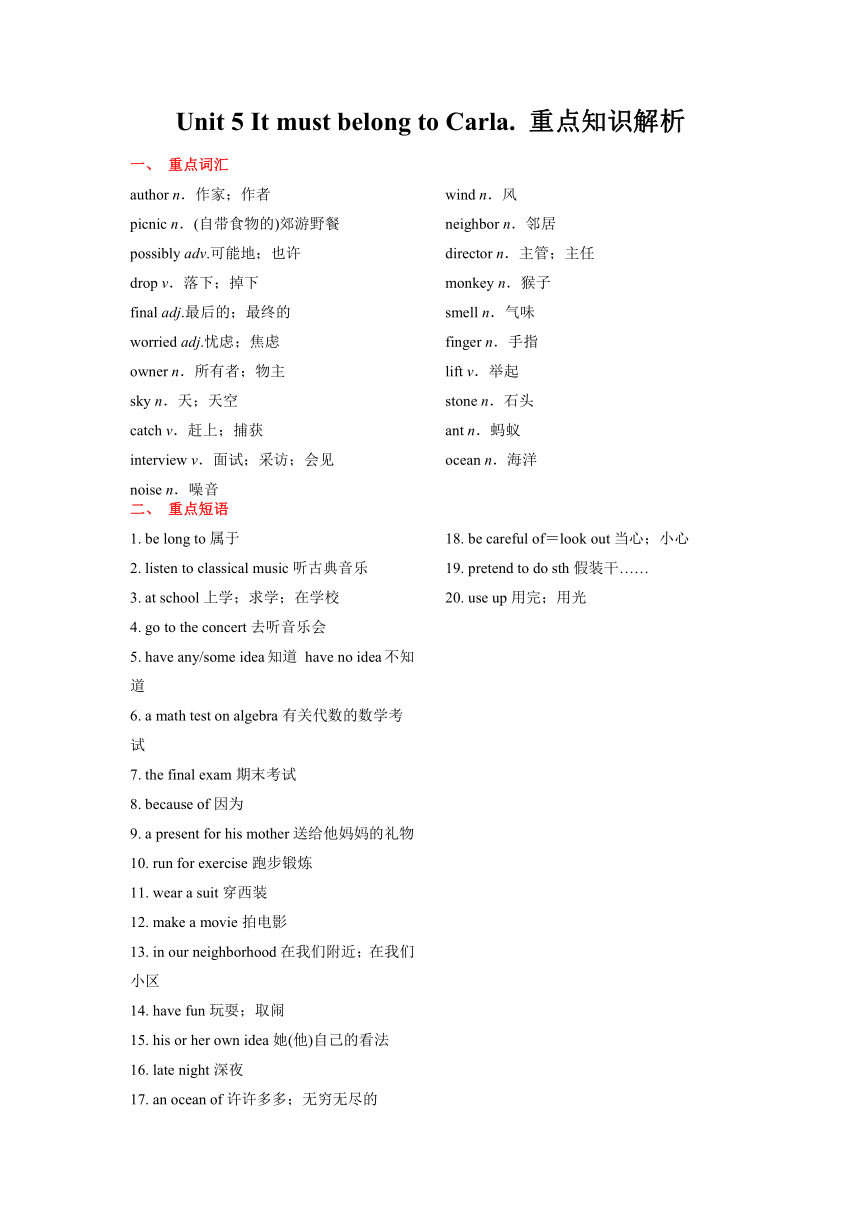
|
|
| 格式 | zip | ||
| 文件大小 | 38.6KB | ||
| 资源类型 | 教案 | ||
| 版本资源 | 人教新目标(Go for it)版 | ||
| 科目 | 英语 | ||
| 更新时间 | 2012-09-01 00:00:00 | ||
图片预览

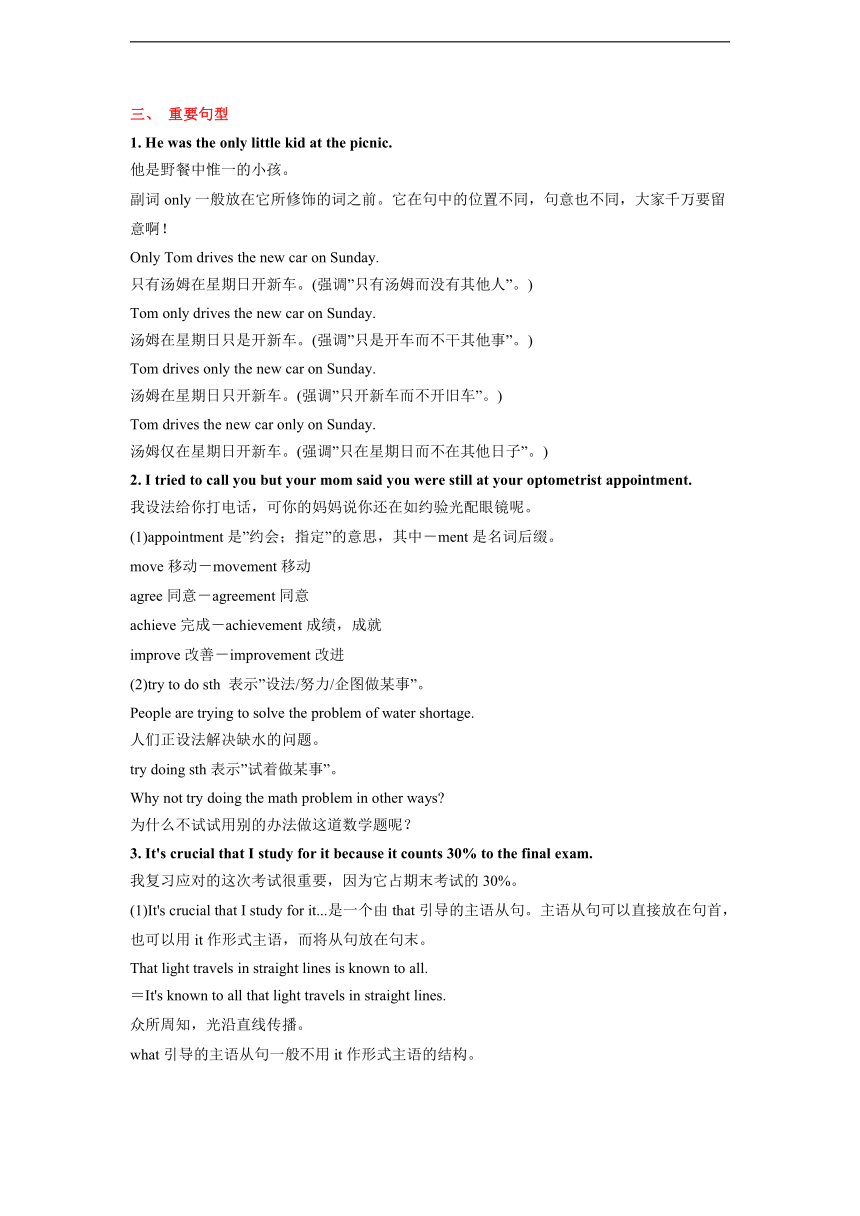
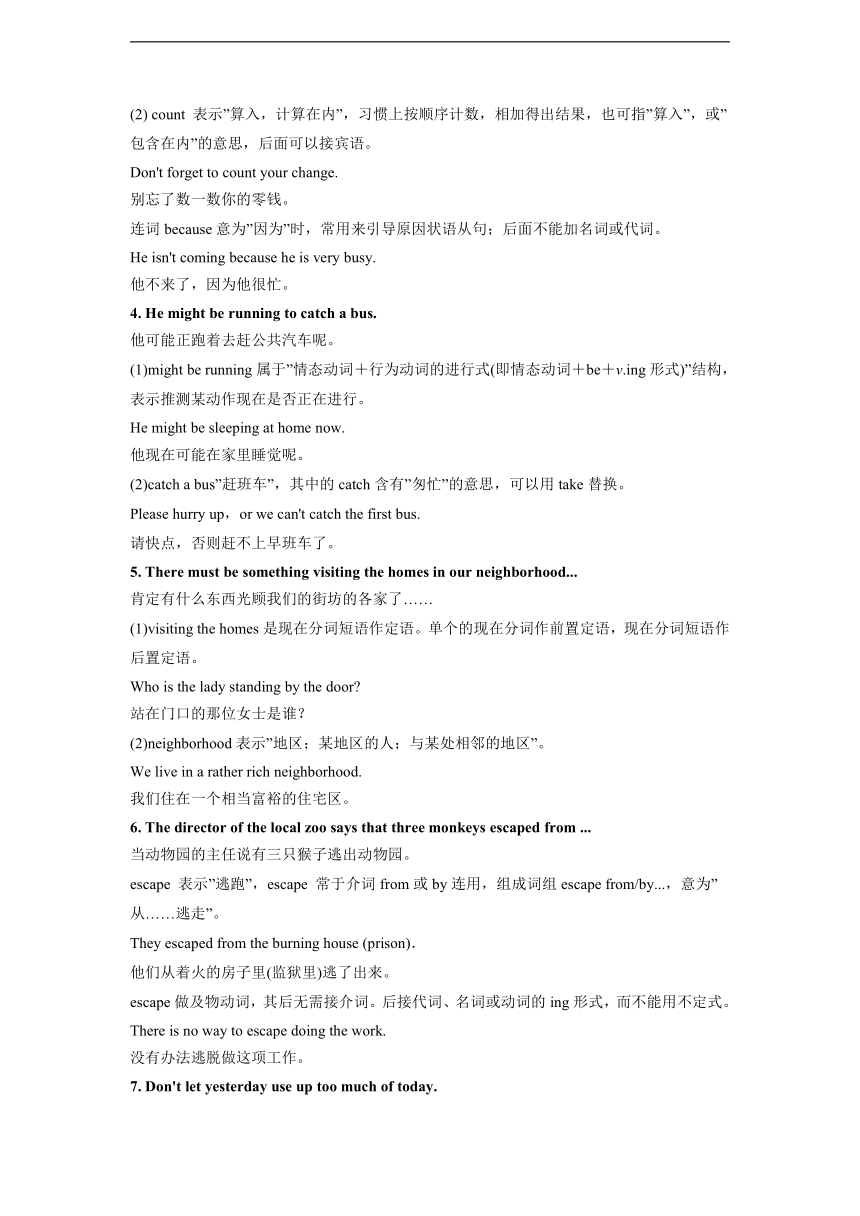
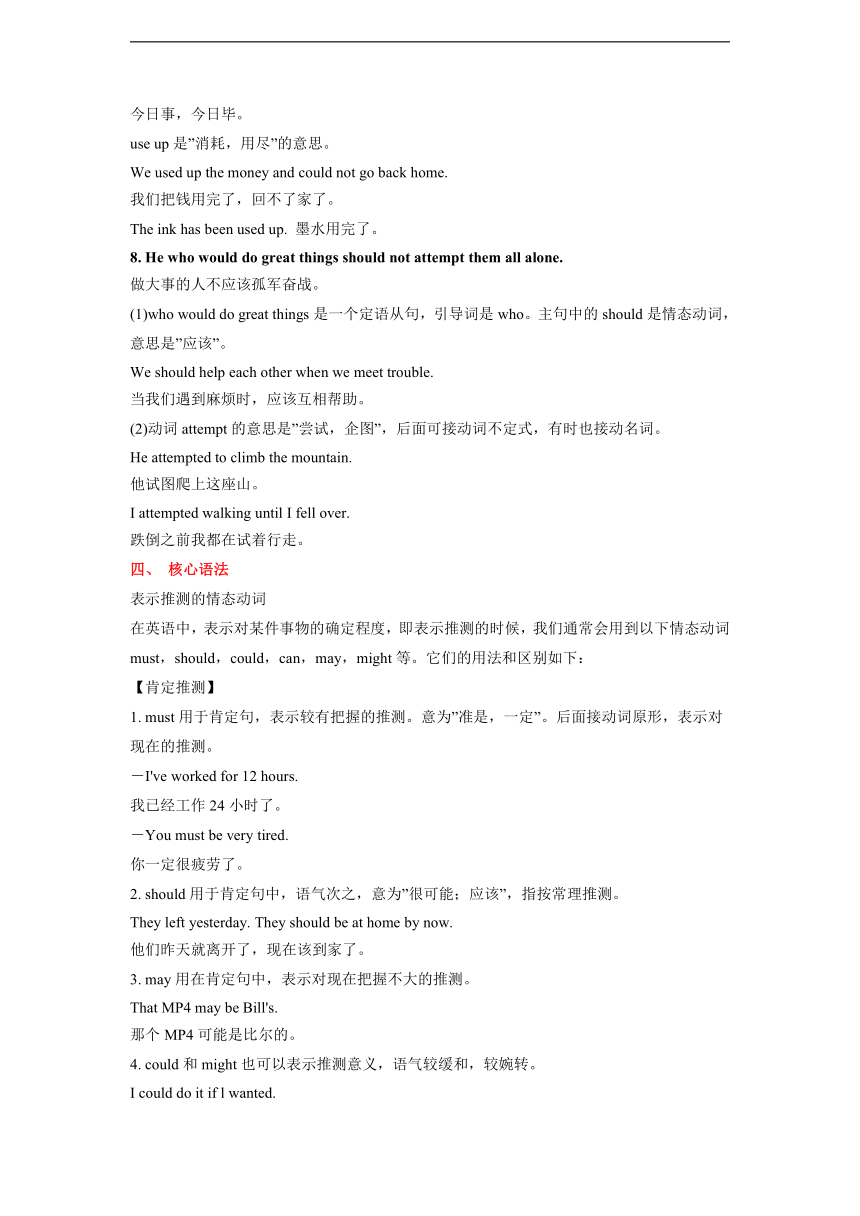
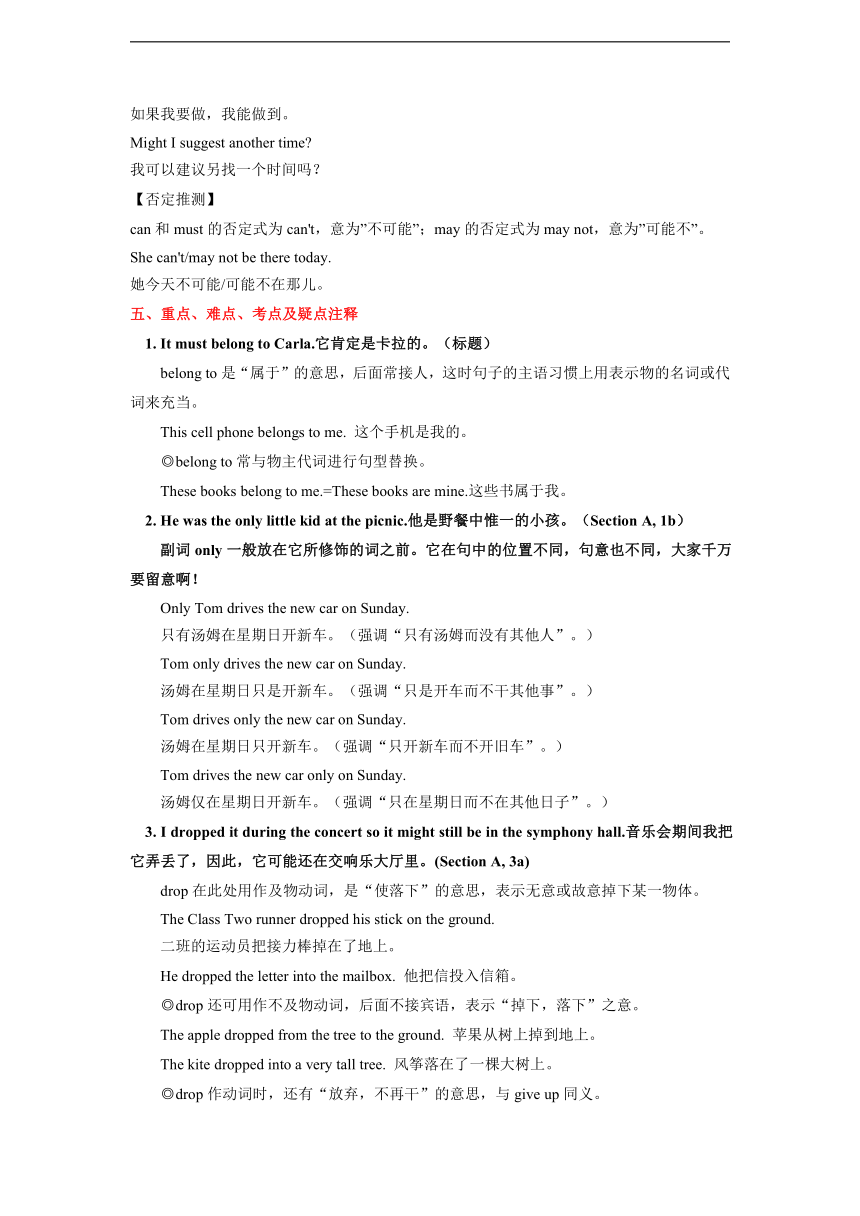
文档简介
Unit 5 It must belong to Carla. 重点知识解析
一、 重点词汇
author n.作家;作者
picnic n.(自带食物的)郊游野餐
possibly adv.可能地;也许
drop v.落下;掉下
final adj.最后的;最终的
worried adj.忧虑;焦虑
owner n.所有者;物主
sky n.天;天空
catch v.赶上;捕获
interview v.面试;采访;会见
noise n.噪音
wind n.风
neighbor n.邻居
director n.主管;主任
monkey n.猴子
smell n.气味
finger n.手指
lift v.举起
stone n.石头
ant n.蚂蚁
ocean n.海洋
二、 重点短语
1. be long to属于
2. listen to classical music听古典音乐
3. at school上学;求学;在学校
4. go to the concert去听音乐会
5. have any/some idea知道 have no idea不知道
6. a math test on algebra有关代数的数学考试
7. the final exam期末考试
8. because of因为
9. a present for his mother送给他妈妈的礼物
10. run for exercise跑步锻炼
11. wear a suit穿西装
12. make a movie拍电影
13. in our neighborhood在我们附近;在我们小区
14. have fun玩耍;取闹
15. his or her own idea她(他)自己的看法
16. late night深夜
17. an ocean of许许多多;无穷无尽的
18. be careful of=look out当心;小心
19. pretend to do sth假装干……
20. use up用完;用光
三、 重要句型
1. He was the only little kid at the picnic.
他是野餐中惟一的小孩。
副词only一般放在它所修饰的词之前。它在句中的位置不同,句意也不同,大家千万要留意啊!
Only Tom drives the new car on Sunday.
只有汤姆在星期日开新车。(强调”只有汤姆而没有其他人”。)
Tom only drives the new car on Sunday.
汤姆在星期日只是开新车。(强调”只是开车而不干其他事”。)
Tom drives only the new car on Sunday.
汤姆在星期日只开新车。(强调”只开新车而不开旧车”。)
Tom drives the new car only on Sunday.
汤姆仅在星期日开新车。(强调”只在星期日而不在其他日子”。)
2. I tried to call you but your mom said you were still at your optometrist appointment.
我设法给你打电话,可你的妈妈说你还在如约验光配眼镜呢。
(1)appointment是”约会;指定”的意思,其中-ment是名词后缀。
move移动-movement移动
agree同意-agreement同意
achieve完成-achievement成绩,成就
improve改善-improvement改进
(2)try to do sth 表示”设法/努力/企图做某事”。
People are trying to solve the problem of water shortage.
人们正设法解决缺水的问题。
try doing sth表示”试着做某事”。
Why not try doing the math problem in other ways
为什么不试试用别的办法做这道数学题呢?
3. It's crucial that I study for it because it counts 30% to the final exam.
我复习应对的这次考试很重要,因为它占期末考试的30%。
(1)It's crucial that I study for it...是一个由that引导的主语从句。主语从句可以直接放在句首,也可以用it作形式主语,而将从句放在句末。
That light travels in straight lines is known to all.
=It's known to all that light travels in straight lines.
众所周知,光沿直线传播。
what引导的主语从句一般不用it作形式主语的结构。
(2) count 表示”算入,计算在内”,习惯上按顺序计数,相加得出结果,也可指”算入”,或”包含在内”的意思,后面可以接宾语。
Don't forget to count your change.
别忘了数一数你的零钱。
连词because意为”因为”时,常用来引导原因状语从句;后面不能加名词或代词。
He isn't coming because he is very busy.
他不来了,因为他很忙。
4. He might be running to catch a bus.
他可能正跑着去赶公共汽车呢。
(1)might be running属于”情态动词+行为动词的进行式(即情态动词+be+v. ing形式)”结构,表示推测某动作现在是否正在进行。
He might be sleeping at home now.
他现在可能在家里睡觉呢。
(2)catch a bus”赶班车”,其中的catch含有”匆忙”的意思,可以用take替换。
Please hurry up,or we can't catch the first bus.
请快点,否则赶不上早班车了。
5. There must be something visiting the homes in our neighborhood...
肯定有什么东西光顾我们的街坊的各家了……
(1)visiting the homes是现在分词短语作定语。单个的现在分词作前置定语,现在分词短语作后置定语。
Who is the lady standing by the door
站在门口的那位女士是谁?
(2)neighborhood表示”地区;某地区的人;与某处相邻的地区”。
We live in a rather rich neighborhood.
我们住在一个相当富裕的住宅区。
6. The director of the local zoo says that three monkeys escaped from ...
当动物园的主任说有三只猴子逃出动物园。
escape 表示”逃跑”,escape 常于介词from或by连用,组成词组escape from/by...,意为”从……逃走”。
They escaped from the burning house (prison).
他们从着火的房子里(监狱里)逃了出来。
escape做及物动词,其后无需接介词。后接代词、名词或动词的ing形式,而不能用不定式。
There is no way to escape doing the work.
没有办法逃脱做这项工作。
7. Don't let yesterday use up too much of today.
今日事,今日毕。
use up是”消耗,用尽”的意思。
We used up the money and could not go back home.
我们把钱用完了,回不了家了。
The ink has been used up. 墨水用完了。
8. He who would do great things should not attempt them all alone.
做大事的人不应该孤军奋战。
(1)who would do great things是一个定语从句,引导词是who。主句中的should是情态动词,意思是”应该”。
We should help each other when we meet trouble.
当我们遇到麻烦时,应该互相帮助。
(2)动词attempt的意思是”尝试,企图”,后面可接动词不定式,有时也接动名词。
He attempted to climb the mountain.
他试图爬上这座山。
I attempted walking until I fell over.
跌倒之前我都在试着行走。
四、 核心语法
表示推测的情态动词
在英语中,表示对某件事物的确定程度,即表示推测的时候,我们通常会用到以下情态动词must,should,could,can,may,might等。它们的用法和区别如下:
【肯定推测】
1. must用于肯定句,表示较有把握的推测。意为”准是,一定”。后面接动词原形,表示对现在的推测。
-I've worked for 12 hours.
我已经工作24小时了。
-You must be very tired.
你一定很疲劳了。
2. should用于肯定句中,语气次之,意为”很可能;应该”,指按常理推测。
They left yesterday. They should be at home by now.
他们昨天就离开了,现在该到家了。
3. may用在肯定句中,表示对现在把握不大的推测。
That MP4 may be Bill's.
那个MP4可能是比尔的。
4. could和might也可以表示推测意义,语气较缓和,较婉转。
I could do it if l wanted.
如果我要做,我能做到。
Might I suggest another time
我可以建议另找一个时间吗?
【否定推测】
can和must的否定式为can't,意为”不可能”;may的否定式为may not,意为”可能不”。
She can't/may not be there today.
她今天不可能/可能不在那儿。
五、重点、难点、考点及疑点注释
1. It must belong to Carla.它肯定是卡拉的。(标题)
belong to是“属于”的意思,后面常接人,这时句子的主语习惯上用表示物的名词或代词来充当。
This cell phone belongs to me. 这个手机是我的。
◎belong to常与物主代词进行句型替换。
These books belong to me.=These books are mine.这些书属于我。
2. He was the only little kid at the picnic.他是野餐中惟一的小孩。(Section A, 1b)
副词only一般放在它所修饰的词之前。它在句中的位置不同,句意也不同,大家千万要留意啊!
Only Tom drives the new car on Sunday.
只有汤姆在星期日开新车。(强调“只有汤姆而没有其他人”。)
Tom only drives the new car on Sunday.
汤姆在星期日只是开新车。(强调“只是开车而不干其他事”。)
Tom drives only the new car on Sunday.
汤姆在星期日只开新车。(强调“只开新车而不开旧车”。)
Tom drives the new car only on Sunday.
汤姆仅在星期日开新车。(强调“只在星期日而不在其他日子”。)
3. I dropped it during the concert so it might still be in the symphony hall.音乐会期间我把它弄丢了,因此,它可能还在交响乐大厅里。(Section A, 3a)
drop在此处用作及物动词,是“使落下”的意思,表示无意或故意掉下某一物体。
The Class Two runner dropped his stick on the ground.
二班的运动员把接力棒掉在了地上。
He dropped the letter into the mailbox. 他把信投入信箱。
◎drop还可用作不及物动词,后面不接宾语,表示“掉下,落下”之意。
The apple dropped from the tree to the ground. 苹果从树上掉到地上。
The kite dropped into a very tall tree. 风筝落在了一棵大树上。
◎drop作动词时,还有“放弃,不再干”的意思,与give up同义。
Don’t drop English. It’s very useful. 不要放弃英语,它非常有用。
Let’s drop that subject and discuss something else.
让我们放弃这个题目,谈点别的吧。
特别提示
drop作名词时,是“滴,少量”;“下降,下落”的意思。
—Would you like some more tea 想再喝点茶吗?
—Just a drop, please. 请给一点。
There was a sudden drop in the temperature. 气温突然下降。
4. I tried to call you but your mom said you were still at your optometrist appointment. 我设法给你打电话,可你的妈妈说你还在如约验光配眼镜呢。(Section A, 3a)
(1)appointment是“约会;指定”的意思,其中-ment是名词后缀。
move移动—movement移动 agree同意—agreement同意
achieve完成—achievement成绩,成就 improve改善—improvement改进
(2)try to do sth. 表示“设法/努力/企图做某事”。
I tried to get there at seven, but I was late.
我设法7点到达那里,但还是迟到了。
People are trying to solve the problem of water shortage.
人们正设法解决缺水的问题。
◎try doing sth.表示“试着做某事”。
Try knocking at the back door if nobody hears you at the front door.
如果前门没有人听到,你就试试敲后门。
Why not try doing the maths problem in other ways
为什么不试试用别的办法做这道数学题呢?
5. I’m really anxious, because I can’t find my backpack.我真的很着急,因为我找不到我的背包了。(Section A, 3a)
anxious在句中作表语,意思是“着急的、忧虑的、担忧的”。
I am very anxious about my mom’s health. 我非常担心我妈妈的健康。
【拓展】anxious可用在以下短语中:
be anxious for sth. 渴望……、希望……
We are anxious for their safety. 我们希望他们平安无事。
be anxious to do sth. 渴望做某事
We are anxious to meet you soon. 我们希望能尽快见到你。
be anxious that … 渴望……、盼望……
They were anxious that aid should be sent soon. 他们盼望着援救物品尽快送到。
6. The earrings might be a present for his mother. (P36)耳环可能是他给他妈妈的礼物。
介词for在这里表示“为”,“给”。 (Section A, 4)
Can I do something for you 我能为你做些什么吗?
知识拓展
下面我们再看看for的其他用法:
◎表示“当作”,“作为”。
I’d like some bread and milk for breakfast. 早饭我想要些面包、牛奶。
◎表示动作的对象或接受者,意为“就……而言”,“对……来说”。
It’s important for us to learn English well. 学好英语对我们来说很重要。
◎表示理由或原因,意为“因为”,“由于”。
Thank you for teaching us so well. 谢谢你把我们教得这么好。
◎表示去向、目标,意为“向,往;取;买”等。
I came here for my schoolbag. 我来这儿取我的书包。
◎表示时间、距离,意为“计,达”。
She has been an English teacher for seven years.她当一名英文老师有七年了。
◎表示与具体条件作比较,意为“比起来”,“就……来看”。
It’s rather hot for May. 对于五月来说,这已相当热了。
7. He might be running to catch a bus. 他可能正跑着去赶公共汽车呢。(Section B, 2c)
(1)might be running属于“情态动词+行为动词的进行式(即情态动词+be+v.-ing形式)”结构,表示推测某动作现在是否正在进行。
He might be sleeping at home now. 他现在可能在家里睡觉呢。
(2)catch a bus“赶班车”,其中的catch含有“匆忙”的意思,可以用take替换。
Please hurry up, or we can’t catch the first bus.
请快点,否则我们赶不上早班车了。
8. However, these days, strange things are happening in our neighborhood and everyone is unhappy.但是这些天,我们街坊发生了一些奇怪的事情,这使得每个人都不开心。(Section B, 3a)
happen是不及物动词,意为“发生”,其主语一般为事,而不能是人,且不能用于被动语态。
This accident happened at the corner. 事故发生在拐角处。
◎表示“……发生了什么事”应用sth. happens/happened to+名词/代词。
Something has happened to the train. 火车出事故了。
知识拓展
happen表示“碰巧”之意时,其主语可以是人,后面常跟动词不定式。
Last Sunday I happened to meet one of my old friends in the street.
上星期天我在街上碰巧遇到了我的一个老朋友。
I happened to be there when the fire started.大火发生时我碰巧在那儿。
◎happen表示“碰巧”时,还可用于It happens/happened that...结构,这种结构可与上述结构互换。
It happened that the famous actor was her brother.
=The famous actor happened to be her brother.
那个著名的演员碰巧是她哥哥。
特别提示
take place意为“发生”时,常指有计划安排的事情的发生与进行,不含偶然的意味。
When will the wedding take place 婚礼什么时候举行?
9. ...but they can’t find anything strange. ……但他们找不到任何奇怪的东西。(Section B, 3a)
something, anything, nothing等不定代词用形容词修饰时,要把形容词放在代词后面,这与形容词放在名词前作定语的汉语规则正好相反。
I gave my sister a new bike for her birthday.
我送给我妹妹一辆新自行车作生日礼物。
There is nothing new in the newspaper. 报纸上没有新消息。
10. I don’t think so!我认为不是这样。(Section B, 3a)
这句话常用于表示不同意对方的意见或观点等,其肯定形式是“I think so.”(我认为是这样的。)表示肯定对方的意见。
— Look at the cloud, it will be rainy soon. 看天上的云彩,很快就要下雨了。
— I don’t think so. I think it will be sunny soon. 我看不会的,我想很快就会天晴的。
—Whose pen is this Is it Li Ming’s 这是谁的钢笔?是李明的吗?
—I think so. 我想是的。
类似句型
I hope so. 我希望是这样的。/I hope not. 我希望不是这样。
I’m afraid so. 恐怕如此。/I’m afraid not. 恐怕不行。
11. There must be something visiting the homes in our neighborhood, …肯定有什么东西在光顾我们的街坊邻居了,……。(Section B, 3a)
在there be 结构中,动词be可以与情态动词连用,表示“可能有……,一定有……”,be有时态的变化。
There might be water if you wait a bit. 如果你等一会儿,可能会有水的。
【拓展】“There be +主语 + v.-ing 形式”结构中,v.-ing形式用作定语,修饰前面的主语,相当于一个定语从句。如:
There are many people waiting for the bus. = There are many people who are waiting for the bus.有许多人在等公共汽车。
12. Maybe it means you’re afraid of too much homework!也许那意味着你害怕有太多的家庭作业!(Section B, 4)
本句中的too much是形容词词组,用来修饰不可数名词homework,意为“太多”,其中心词是much,副词too修饰much,以加强语气。
I don’t like winter because there’s too much snow and ice.
我不喜欢冬天,因为有太多冰雪。
People don’t need to spend too much money.人们不需要花太多的钱。
特别提示
much too的含义是“(实在)太……”,它常用作副词,用来修饰形容词或副词,much用来加强语气,修饰too,表示“太”,“过于”。
This job is much too heavy for so young a boy.
这项工作对这么小的男孩来说实在太重了。
He spent too much time on computer games. 他玩电脑游戏的时间太多了。
13. Don’t let yesterday use up too much of today. 不要让昨天占去了今天太多的时间 (昨天的事昨天做,今天还有今天事)。(Self Check)
use up是“消耗,用尽”的意思。
We used up the money and could not go back home.
我们把钱用完了,回不了家了。
The ink has been used up. 墨水用完了。
六、热身训练
1. —Where is Tom He hasn’t come to school today. —I think he _____be ill.
A. would B. can C. can’t D. might
2. —There is somebody at the door. Who _____it be Is it the postman
—No, it ____ be him. It’s just seven o’clock. It’s too early.
A. can; can’t B. will; won’t C. may; mustn’t D. must; may not
3. Have a glass of water, please. You be thirsty after running.
A. must B. should C. can D. have to
4. Tina be in Paris, for I saw her here only half an hour ago.
A. can’t B. mustn’t C. needn’t D. may not
5. —Excuse me, is this the right way to No. 1 Middle School
—Sorry, I’m not sure. But it be.
A. can B. need C. must D. may
6. I haven’t seen Alice for several years. She be a big girl now.
7. The brown wallet be Tom’s or Bill’s. They both like brown.
8. —Who is the man over there Is it Mr Li —No, it be him. Mr Li is much taller.
9. 这张照片一定是 Hop 的。
The photo_________ _________Hop’s.
10. 听!一定有人在隔壁唱歌跳舞。
Listen! There some people and dancing next door.
答案:
1—5 DAAAD 6. must 7. might / could 8. can’t 9. must be 10. must be; singing
一、 重点词汇
author n.作家;作者
picnic n.(自带食物的)郊游野餐
possibly adv.可能地;也许
drop v.落下;掉下
final adj.最后的;最终的
worried adj.忧虑;焦虑
owner n.所有者;物主
sky n.天;天空
catch v.赶上;捕获
interview v.面试;采访;会见
noise n.噪音
wind n.风
neighbor n.邻居
director n.主管;主任
monkey n.猴子
smell n.气味
finger n.手指
lift v.举起
stone n.石头
ant n.蚂蚁
ocean n.海洋
二、 重点短语
1. be long to属于
2. listen to classical music听古典音乐
3. at school上学;求学;在学校
4. go to the concert去听音乐会
5. have any/some idea知道 have no idea不知道
6. a math test on algebra有关代数的数学考试
7. the final exam期末考试
8. because of因为
9. a present for his mother送给他妈妈的礼物
10. run for exercise跑步锻炼
11. wear a suit穿西装
12. make a movie拍电影
13. in our neighborhood在我们附近;在我们小区
14. have fun玩耍;取闹
15. his or her own idea她(他)自己的看法
16. late night深夜
17. an ocean of许许多多;无穷无尽的
18. be careful of=look out当心;小心
19. pretend to do sth假装干……
20. use up用完;用光
三、 重要句型
1. He was the only little kid at the picnic.
他是野餐中惟一的小孩。
副词only一般放在它所修饰的词之前。它在句中的位置不同,句意也不同,大家千万要留意啊!
Only Tom drives the new car on Sunday.
只有汤姆在星期日开新车。(强调”只有汤姆而没有其他人”。)
Tom only drives the new car on Sunday.
汤姆在星期日只是开新车。(强调”只是开车而不干其他事”。)
Tom drives only the new car on Sunday.
汤姆在星期日只开新车。(强调”只开新车而不开旧车”。)
Tom drives the new car only on Sunday.
汤姆仅在星期日开新车。(强调”只在星期日而不在其他日子”。)
2. I tried to call you but your mom said you were still at your optometrist appointment.
我设法给你打电话,可你的妈妈说你还在如约验光配眼镜呢。
(1)appointment是”约会;指定”的意思,其中-ment是名词后缀。
move移动-movement移动
agree同意-agreement同意
achieve完成-achievement成绩,成就
improve改善-improvement改进
(2)try to do sth 表示”设法/努力/企图做某事”。
People are trying to solve the problem of water shortage.
人们正设法解决缺水的问题。
try doing sth表示”试着做某事”。
Why not try doing the math problem in other ways
为什么不试试用别的办法做这道数学题呢?
3. It's crucial that I study for it because it counts 30% to the final exam.
我复习应对的这次考试很重要,因为它占期末考试的30%。
(1)It's crucial that I study for it...是一个由that引导的主语从句。主语从句可以直接放在句首,也可以用it作形式主语,而将从句放在句末。
That light travels in straight lines is known to all.
=It's known to all that light travels in straight lines.
众所周知,光沿直线传播。
what引导的主语从句一般不用it作形式主语的结构。
(2) count 表示”算入,计算在内”,习惯上按顺序计数,相加得出结果,也可指”算入”,或”包含在内”的意思,后面可以接宾语。
Don't forget to count your change.
别忘了数一数你的零钱。
连词because意为”因为”时,常用来引导原因状语从句;后面不能加名词或代词。
He isn't coming because he is very busy.
他不来了,因为他很忙。
4. He might be running to catch a bus.
他可能正跑着去赶公共汽车呢。
(1)might be running属于”情态动词+行为动词的进行式(即情态动词+be+v. ing形式)”结构,表示推测某动作现在是否正在进行。
He might be sleeping at home now.
他现在可能在家里睡觉呢。
(2)catch a bus”赶班车”,其中的catch含有”匆忙”的意思,可以用take替换。
Please hurry up,or we can't catch the first bus.
请快点,否则赶不上早班车了。
5. There must be something visiting the homes in our neighborhood...
肯定有什么东西光顾我们的街坊的各家了……
(1)visiting the homes是现在分词短语作定语。单个的现在分词作前置定语,现在分词短语作后置定语。
Who is the lady standing by the door
站在门口的那位女士是谁?
(2)neighborhood表示”地区;某地区的人;与某处相邻的地区”。
We live in a rather rich neighborhood.
我们住在一个相当富裕的住宅区。
6. The director of the local zoo says that three monkeys escaped from ...
当动物园的主任说有三只猴子逃出动物园。
escape 表示”逃跑”,escape 常于介词from或by连用,组成词组escape from/by...,意为”从……逃走”。
They escaped from the burning house (prison).
他们从着火的房子里(监狱里)逃了出来。
escape做及物动词,其后无需接介词。后接代词、名词或动词的ing形式,而不能用不定式。
There is no way to escape doing the work.
没有办法逃脱做这项工作。
7. Don't let yesterday use up too much of today.
今日事,今日毕。
use up是”消耗,用尽”的意思。
We used up the money and could not go back home.
我们把钱用完了,回不了家了。
The ink has been used up. 墨水用完了。
8. He who would do great things should not attempt them all alone.
做大事的人不应该孤军奋战。
(1)who would do great things是一个定语从句,引导词是who。主句中的should是情态动词,意思是”应该”。
We should help each other when we meet trouble.
当我们遇到麻烦时,应该互相帮助。
(2)动词attempt的意思是”尝试,企图”,后面可接动词不定式,有时也接动名词。
He attempted to climb the mountain.
他试图爬上这座山。
I attempted walking until I fell over.
跌倒之前我都在试着行走。
四、 核心语法
表示推测的情态动词
在英语中,表示对某件事物的确定程度,即表示推测的时候,我们通常会用到以下情态动词must,should,could,can,may,might等。它们的用法和区别如下:
【肯定推测】
1. must用于肯定句,表示较有把握的推测。意为”准是,一定”。后面接动词原形,表示对现在的推测。
-I've worked for 12 hours.
我已经工作24小时了。
-You must be very tired.
你一定很疲劳了。
2. should用于肯定句中,语气次之,意为”很可能;应该”,指按常理推测。
They left yesterday. They should be at home by now.
他们昨天就离开了,现在该到家了。
3. may用在肯定句中,表示对现在把握不大的推测。
That MP4 may be Bill's.
那个MP4可能是比尔的。
4. could和might也可以表示推测意义,语气较缓和,较婉转。
I could do it if l wanted.
如果我要做,我能做到。
Might I suggest another time
我可以建议另找一个时间吗?
【否定推测】
can和must的否定式为can't,意为”不可能”;may的否定式为may not,意为”可能不”。
She can't/may not be there today.
她今天不可能/可能不在那儿。
五、重点、难点、考点及疑点注释
1. It must belong to Carla.它肯定是卡拉的。(标题)
belong to是“属于”的意思,后面常接人,这时句子的主语习惯上用表示物的名词或代词来充当。
This cell phone belongs to me. 这个手机是我的。
◎belong to常与物主代词进行句型替换。
These books belong to me.=These books are mine.这些书属于我。
2. He was the only little kid at the picnic.他是野餐中惟一的小孩。(Section A, 1b)
副词only一般放在它所修饰的词之前。它在句中的位置不同,句意也不同,大家千万要留意啊!
Only Tom drives the new car on Sunday.
只有汤姆在星期日开新车。(强调“只有汤姆而没有其他人”。)
Tom only drives the new car on Sunday.
汤姆在星期日只是开新车。(强调“只是开车而不干其他事”。)
Tom drives only the new car on Sunday.
汤姆在星期日只开新车。(强调“只开新车而不开旧车”。)
Tom drives the new car only on Sunday.
汤姆仅在星期日开新车。(强调“只在星期日而不在其他日子”。)
3. I dropped it during the concert so it might still be in the symphony hall.音乐会期间我把它弄丢了,因此,它可能还在交响乐大厅里。(Section A, 3a)
drop在此处用作及物动词,是“使落下”的意思,表示无意或故意掉下某一物体。
The Class Two runner dropped his stick on the ground.
二班的运动员把接力棒掉在了地上。
He dropped the letter into the mailbox. 他把信投入信箱。
◎drop还可用作不及物动词,后面不接宾语,表示“掉下,落下”之意。
The apple dropped from the tree to the ground. 苹果从树上掉到地上。
The kite dropped into a very tall tree. 风筝落在了一棵大树上。
◎drop作动词时,还有“放弃,不再干”的意思,与give up同义。
Don’t drop English. It’s very useful. 不要放弃英语,它非常有用。
Let’s drop that subject and discuss something else.
让我们放弃这个题目,谈点别的吧。
特别提示
drop作名词时,是“滴,少量”;“下降,下落”的意思。
—Would you like some more tea 想再喝点茶吗?
—Just a drop, please. 请给一点。
There was a sudden drop in the temperature. 气温突然下降。
4. I tried to call you but your mom said you were still at your optometrist appointment. 我设法给你打电话,可你的妈妈说你还在如约验光配眼镜呢。(Section A, 3a)
(1)appointment是“约会;指定”的意思,其中-ment是名词后缀。
move移动—movement移动 agree同意—agreement同意
achieve完成—achievement成绩,成就 improve改善—improvement改进
(2)try to do sth. 表示“设法/努力/企图做某事”。
I tried to get there at seven, but I was late.
我设法7点到达那里,但还是迟到了。
People are trying to solve the problem of water shortage.
人们正设法解决缺水的问题。
◎try doing sth.表示“试着做某事”。
Try knocking at the back door if nobody hears you at the front door.
如果前门没有人听到,你就试试敲后门。
Why not try doing the maths problem in other ways
为什么不试试用别的办法做这道数学题呢?
5. I’m really anxious, because I can’t find my backpack.我真的很着急,因为我找不到我的背包了。(Section A, 3a)
anxious在句中作表语,意思是“着急的、忧虑的、担忧的”。
I am very anxious about my mom’s health. 我非常担心我妈妈的健康。
【拓展】anxious可用在以下短语中:
be anxious for sth. 渴望……、希望……
We are anxious for their safety. 我们希望他们平安无事。
be anxious to do sth. 渴望做某事
We are anxious to meet you soon. 我们希望能尽快见到你。
be anxious that … 渴望……、盼望……
They were anxious that aid should be sent soon. 他们盼望着援救物品尽快送到。
6. The earrings might be a present for his mother. (P36)耳环可能是他给他妈妈的礼物。
介词for在这里表示“为”,“给”。 (Section A, 4)
Can I do something for you 我能为你做些什么吗?
知识拓展
下面我们再看看for的其他用法:
◎表示“当作”,“作为”。
I’d like some bread and milk for breakfast. 早饭我想要些面包、牛奶。
◎表示动作的对象或接受者,意为“就……而言”,“对……来说”。
It’s important for us to learn English well. 学好英语对我们来说很重要。
◎表示理由或原因,意为“因为”,“由于”。
Thank you for teaching us so well. 谢谢你把我们教得这么好。
◎表示去向、目标,意为“向,往;取;买”等。
I came here for my schoolbag. 我来这儿取我的书包。
◎表示时间、距离,意为“计,达”。
She has been an English teacher for seven years.她当一名英文老师有七年了。
◎表示与具体条件作比较,意为“比起来”,“就……来看”。
It’s rather hot for May. 对于五月来说,这已相当热了。
7. He might be running to catch a bus. 他可能正跑着去赶公共汽车呢。(Section B, 2c)
(1)might be running属于“情态动词+行为动词的进行式(即情态动词+be+v.-ing形式)”结构,表示推测某动作现在是否正在进行。
He might be sleeping at home now. 他现在可能在家里睡觉呢。
(2)catch a bus“赶班车”,其中的catch含有“匆忙”的意思,可以用take替换。
Please hurry up, or we can’t catch the first bus.
请快点,否则我们赶不上早班车了。
8. However, these days, strange things are happening in our neighborhood and everyone is unhappy.但是这些天,我们街坊发生了一些奇怪的事情,这使得每个人都不开心。(Section B, 3a)
happen是不及物动词,意为“发生”,其主语一般为事,而不能是人,且不能用于被动语态。
This accident happened at the corner. 事故发生在拐角处。
◎表示“……发生了什么事”应用sth. happens/happened to+名词/代词。
Something has happened to the train. 火车出事故了。
知识拓展
happen表示“碰巧”之意时,其主语可以是人,后面常跟动词不定式。
Last Sunday I happened to meet one of my old friends in the street.
上星期天我在街上碰巧遇到了我的一个老朋友。
I happened to be there when the fire started.大火发生时我碰巧在那儿。
◎happen表示“碰巧”时,还可用于It happens/happened that...结构,这种结构可与上述结构互换。
It happened that the famous actor was her brother.
=The famous actor happened to be her brother.
那个著名的演员碰巧是她哥哥。
特别提示
take place意为“发生”时,常指有计划安排的事情的发生与进行,不含偶然的意味。
When will the wedding take place 婚礼什么时候举行?
9. ...but they can’t find anything strange. ……但他们找不到任何奇怪的东西。(Section B, 3a)
something, anything, nothing等不定代词用形容词修饰时,要把形容词放在代词后面,这与形容词放在名词前作定语的汉语规则正好相反。
I gave my sister a new bike for her birthday.
我送给我妹妹一辆新自行车作生日礼物。
There is nothing new in the newspaper. 报纸上没有新消息。
10. I don’t think so!我认为不是这样。(Section B, 3a)
这句话常用于表示不同意对方的意见或观点等,其肯定形式是“I think so.”(我认为是这样的。)表示肯定对方的意见。
— Look at the cloud, it will be rainy soon. 看天上的云彩,很快就要下雨了。
— I don’t think so. I think it will be sunny soon. 我看不会的,我想很快就会天晴的。
—Whose pen is this Is it Li Ming’s 这是谁的钢笔?是李明的吗?
—I think so. 我想是的。
类似句型
I hope so. 我希望是这样的。/I hope not. 我希望不是这样。
I’m afraid so. 恐怕如此。/I’m afraid not. 恐怕不行。
11. There must be something visiting the homes in our neighborhood, …肯定有什么东西在光顾我们的街坊邻居了,……。(Section B, 3a)
在there be 结构中,动词be可以与情态动词连用,表示“可能有……,一定有……”,be有时态的变化。
There might be water if you wait a bit. 如果你等一会儿,可能会有水的。
【拓展】“There be +主语 + v.-ing 形式”结构中,v.-ing形式用作定语,修饰前面的主语,相当于一个定语从句。如:
There are many people waiting for the bus. = There are many people who are waiting for the bus.有许多人在等公共汽车。
12. Maybe it means you’re afraid of too much homework!也许那意味着你害怕有太多的家庭作业!(Section B, 4)
本句中的too much是形容词词组,用来修饰不可数名词homework,意为“太多”,其中心词是much,副词too修饰much,以加强语气。
I don’t like winter because there’s too much snow and ice.
我不喜欢冬天,因为有太多冰雪。
People don’t need to spend too much money.人们不需要花太多的钱。
特别提示
much too的含义是“(实在)太……”,它常用作副词,用来修饰形容词或副词,much用来加强语气,修饰too,表示“太”,“过于”。
This job is much too heavy for so young a boy.
这项工作对这么小的男孩来说实在太重了。
He spent too much time on computer games. 他玩电脑游戏的时间太多了。
13. Don’t let yesterday use up too much of today. 不要让昨天占去了今天太多的时间 (昨天的事昨天做,今天还有今天事)。(Self Check)
use up是“消耗,用尽”的意思。
We used up the money and could not go back home.
我们把钱用完了,回不了家了。
The ink has been used up. 墨水用完了。
六、热身训练
1. —Where is Tom He hasn’t come to school today. —I think he _____be ill.
A. would B. can C. can’t D. might
2. —There is somebody at the door. Who _____it be Is it the postman
—No, it ____ be him. It’s just seven o’clock. It’s too early.
A. can; can’t B. will; won’t C. may; mustn’t D. must; may not
3. Have a glass of water, please. You be thirsty after running.
A. must B. should C. can D. have to
4. Tina be in Paris, for I saw her here only half an hour ago.
A. can’t B. mustn’t C. needn’t D. may not
5. —Excuse me, is this the right way to No. 1 Middle School
—Sorry, I’m not sure. But it be.
A. can B. need C. must D. may
6. I haven’t seen Alice for several years. She be a big girl now.
7. The brown wallet be Tom’s or Bill’s. They both like brown.
8. —Who is the man over there Is it Mr Li —No, it be him. Mr Li is much taller.
9. 这张照片一定是 Hop 的。
The photo_________ _________Hop’s.
10. 听!一定有人在隔壁唱歌跳舞。
Listen! There some people and dancing next door.
答案:
1—5 DAAAD 6. must 7. might / could 8. can’t 9. must be 10. must be; singing
同课章节目录
- Unit 1 How can we become good learners.
- Section A
- Section B
- Unit 2 I think that mooncakes are delicious!
- Section A
- Section B
- Unit 3 Could you please tell me where the restroom
- Section A
- Section B
- Unit 4 I used to be afraid of the dark.
- Section A
- Section B
- Unit 5 What are the shirts made of?
- Section A
- Section B
- Review of Units 1-5
- Unit 6 When was it invented?
- Section A
- Section B
- Unit 7 Teenagers should be allowed to choose their
- Section A
- Section B
- Unit 8 It must belong to Carla.
- Section A
- Section B
- Unit 9 I like music that I can dance to.
- Section A
- Section B
- Unit 10 You're supposed to shake hands.
- Section A
- Section B
- Review of Units 6-10
- Unit 11 Sad movies make me cry.
- Section A
- Section B
- Unit 12 Life is full of the unexpected
- Section A
- Section B
- Unit 13 We're trying to save the earth!
- Section A
- Section B
- Unit 14 I remember meeting all of you in Grade 7.
- Section A
- Section B
- Review of Units 11-14
